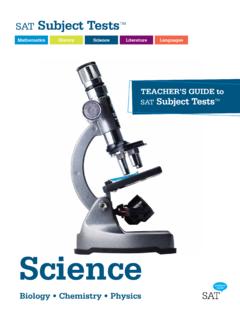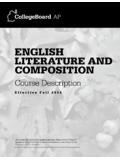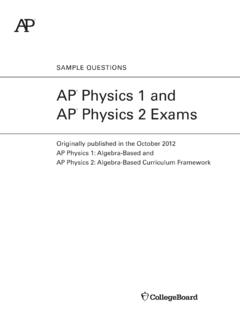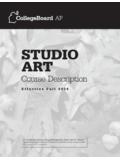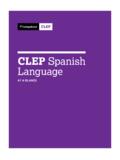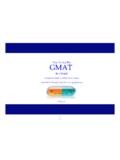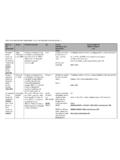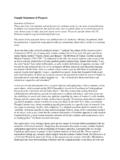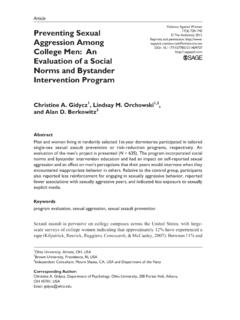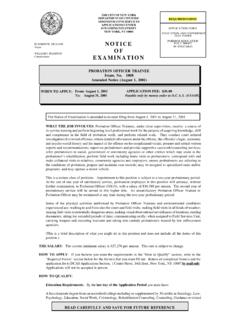Transcription of CLEP Introductory Psychology: At a Glance - …
1 1 CLEP Introductory psychology : At a GlanceDescription of the ExaminationThe Introductory psychology examination covers material that is usually taught in a one-semester undergraduate course in Introductory psychology . It stresses basic facts, concepts and generally accepted principles in the 13 areas listed in the following examination contains approximately 95 questions to be answered in 90 minutes. Some of these are pretest questions that will not be and Skills RequiredQuestions on the Introductory psychology examination require candidates to demonstrate one or more of the following: Knowledge of terminology, principles and theory Ability to comprehend, evaluate and analyze problem situations Ability to apply knowledge to new situationsThe subject matter of the Introductory psychology examination is drawn from the following topics. The percentages next to the main topics indicate the approximate percentage of exam questions on that 9% History, Approaches, MethodsHistory of psychologyApproaches: biological, behavioral, cognitive, humanistic, psychodynamicResearch methods: experimental, clinical, correlationalEthics in research8 9% Biological Bases of BehaviorEndocrine systemEtiologyFunctional organization of the nervous systemGeneticsNeuroanatomyPhysiological techniques7 8% Sensation and PerceptionAttentionOther senses: somesthesis, olfaction, gustation, vestibular systemPerceptual developmentPerceptual processesReceptor processes: vision, auditionSensory mechanisms.
2 Thresholds, adaptation5 6% States of ConsciousnessHypnosis and meditationPsychoactive drug effectsSleep and dreaming10 11% LearningBiological basesClassical conditioningCognitive process in learningObservational learningOperant conditioning8 9% CognitionIntelligence and creativityLanguageMemoryThinking and problem solving7 8% Motivation and EmotionBiological basesHunger, thirst, sex, painSocial motivationTheories of emotionTheories of motivation8 9% Developmental PsychologyDimensions of development: physical, cognitive, social, moralGender identity and sex rolesHeredity environment issuesResearch methods: longitudinal, cross-sectionalTheories of development7 8% PersonalityAssessment techniquesGrowth and adjustmentPersonality theories and approaches2 CLEP Introductory psychology : At a GlanceResearch methods: idiographic, nomotheticSelf-concept, self-esteem8 9% Psychological Disorders and HealthAffective disordersAnxiety disordersDissociative disordersHealth, stress and copingPersonality disordersPsychosesSomatoform disordersTheories of psychopathology7 8% Treatment of Psychological DisordersBehavioral therapiesBiological and drug therapiesCognitive therapiesCommunity and preventive approachesInsight therapies.
3 Psychodynamic and humanistic approaches7 8% Social PsychologyAggression/antisocial behaviorAttitudes and attitude changeAttribution processesConformity, compliance, obedienceGroup dynamicsInterpersonal perception3 4% Statistics, Tests and MeasurementDescriptive statisticsInferential statisticsMeasurement of intelligenceMental handicapping conditionsReliability and validitySamples, populations, normsTypes of testsStudy ResourcesMost textbooks used in college-level Introductory psychology courses cover the topics in the outline above, but the approaches to certain topics and the emphases given to them may differ. To prepare for the CLEP Introductory psychology exam, it is advisable to study one or more college textbooks, which can be found for sale online or in most college bookstores. You may also find it helpful to supplement your reading with books listed in the bibliographies that can be found in most psychology recent survey conducted by CLEP found that the following textbooks are among those used by college faculty who teach the equivalent course.
4 Most of these have companion websites with practice test questions and other study resources. HINT: When selecting a textbook, check the table of contents against the Knowledge and Skills Required for this and Lefton, psychology (Allyn & Bacon)Coon, psychology : A Modular Approach to Mind and Behavior (Wadsworth)Feldman, Essentials of Understanding psychology (McGraw-Hill)Gerrig and Zimbardo, psychology and Life (Allyn & Bacon)Hockenbury and Hockenbury, psychology (Worth)Huffman, Living psychology (Wiley)Kowalski and Westen, psychology (Wiley)Lahey, Essentials of psychology : An Introduction (McGraw-Hill)Meyer and Ciccarelli, psychology (Prentice Hall)Myers, Exploring psychology (Worth)Nairne, psychology : The Adaptive Mind (Wadsworth)Pastorino and Doyle-Portillo, What Is psychology ? (Wadsworth)Rosenberg and Kosslyn, psychology in Context (Allyn & Bacon)Santrock, psychology Essentials (McGraw-Hill)Smith and Passer, psychology : The Science of Mind and Behavior (McGraw-Hill)Wood et al.
5 , The World of psychology : Portable Edition (Allyn & Bacon)Zimbardo et al., psychology Core Concepts (Allyn & Bacon)In addition, the following resources, compiled by the CLEP test development committee and staff members, may help you study for your exam. However, none of these sources are designed specifically to provide preparation for a CLEP exam. The College Board has no control over their content and cannot vouch for Introductory psychology : At a (Psych Web includes resource links and an Introductory psychology textbook) (PsychExperiments on the Internet) (Centre for psychology Resources) (American Psychological Association Resources)Visit for additional psychology resources. You can also find suggestions for exam preparation in Chapter IV of the CLEP Official Study Guide. In addition, many college faculty post their course materials on their schools Test QuestionsThe following sample questions do not appear on an actual CLEP examination.
6 They are intended to give potential test-takers an indication of the format and difficulty level of the examination and to provide content for practice and review. For more sample questions and info about the test, see the CLEP Official Study The behavioral research perspective is similar to the sociocultural research perspective because both focus on how behavior and mental processes are explained by(A) internal factors such as genes (B) the external environment (C) memory systems(D) evolution (E) problem-solving skills and reasoning2. Which of the following cortical areas is most closely associated with vision?(A) Frontal (B) Prefrontal (C) Temporal (D) Occipital (E) Parietal 3. Frequency theory and place theory attempt to explain how the inner ear registers the pitch of sound. Which statement best reflects current opinion about frequency theory and place theory? (A) Evidence strongly supports frequency theory.(B) Evidence strongly supports place theory.
7 (C) Place theory explains the perception of complex sounds well, whereas frequency theory explains the perception of simple sounds well.(D) Place theory explains the perception of high-frequency sounds well, and frequency theory explains the perception of low-frequency sounds well.(E) There is little evidence to support either After initial conditioning, an unconditioned stimulus is no longer presented with the conditioned stimulus, and the conditioned response gradually stops occurring. This change in behavior is called(A) extinction(B) counterconditioning(C) higher-order conditioning(D) stimulus discrimination(E) stimulus generalization5. Priming is considered part of implicit memory because it(A) occurs without conscious awareness(B) often involves emotions(C) helps in recognition but not in recall(D) plays an important role in autobiographical memory(E) requires deep encoding6. Which of the following is a disadvantage of relying on external rewards to motivate behavior?
8 (A) There is potential to reduce extrinsic motivation.(B) There is potential to reduce intrinsic motivation.(C) It increases fear of failure.(D) It increases fear of success.(E) It decreases Researchers know that infants sense of smell is fairly well developed at birth because newborns prefer the smell of(A) sweet-smelling to the smell of sour-smelling foods(B) meat to the smell of fruits(C) a nursing pad from their mother to the smell of a pad from another mother4 CLEP Introductory psychology : At a Glance (D) an acid to the smell of a base(E) a baby s clothing to the smell of an adult s clothing8. Amy appears to have an irrational and maladaptive fear of flying. She will not fly to visit her children and grandchildren, and she has even lost a job because she refused to fly to meet clients. Amy would most likely be diagnosed with which of the following anxiety disorders?(A) Generalized anxiety(B) Specific phobia(C) Social phobia(D) Obsessive compulsive(E) Panic9.
9 Tom fails his math exam. If he explains his failure by using an internal attribution, his reason for failing might be which of the following?(A) The teacher was unclear when presenting the material in class.(B) Tom s job did not leave him enough time to study.(C) The person sitting next to Tom during the exam was very distracting.(D) There was not enough time allotted to complete the exam.(E) Tom is not smart or not good at math. 10. In order to illustrate how often a particular score occurs in a given data set, researchers use (A) inferential techniques(B) cognitive mapping(C) cluster analysis(D) the median(E) a frequency distributionCredit RecommendationsThe American Council on Education has recommended that colleges grant 3 credits for a score of 50, which is equivalent to a course grade of C, on the CLEP Introductory psychology exam. Each college, however, is responsible for setting its own policy. For candidates with satisfactory scores on the Introductory psychology examination, colleges may grant credit toward fulfillment of a distribution requirement, or for a particular course that matches the exam in content.
10 Check with your school to find out the score it requires for granting credit, the number of credit hours granted and the course that can be bypassed with a passing to Sample Questions: 1-B; 2-D; 3-D; 4-A; 5-A; 6-B; 7-C; 8-B; 9-E.
